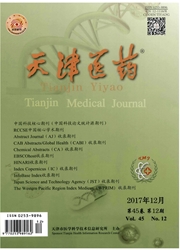

 中文摘要:
中文摘要:
间充质干细胞(MSCs)是当前细胞治疗的研究热点,其不仅具有多向分化潜能,还能够调节颅脑创伤(TBI)后组织损伤引发的炎症反应。继发于单纯机械损伤的神经炎症是引起神经细胞坏死和凋亡的重要因素,即使在颅内压恢复正常后,炎症反应仍持续造成神经细胞坏死。创伤后的炎症环境严重影响TBI患者的长期预后及行为功能恢复。MSCs通过释放可溶性细胞因子,如前列腺素E2(PGE2)、肿瘤坏死因子刺激基因6蛋白(TSG-6)、白细胞介素(IL)-1和转化生长因子(TGF)-β等,调节巨噬细胞/小胶质细胞的极化特性,使其向抗炎型M2细胞极化,减少促炎因子释放,限制其对下游效应细胞的激活,维持颅内免疫环境稳定。同时,MSCs在一定条件下促进巨噬细胞/小胶质细胞向M1细胞极化,激活组织修复和再生。巨噬细胞/小胶质细胞形成的免疫微环境也影响MSCs的存活和功能发挥,两者相互影响,为临床治疗TBI继发炎症反应提供了新的思路。
 英文摘要:
英文摘要:
Mesenchymal stem cells (MSCs), which are regarded as the promising option of cell replacement therapy, are able to regulate immune response after tissue damage caused by traumatic brain injury (TBI). Secondary neuroinflammation following the mechanical injury is the essential factor of neural cell necrosis and apoptosis, even after the intracranial pressure has returned to normal. Their immune environments caused by neuroinflammtary response determine the outcomeand long-term behavior function of TBI in survivors directly. MSCs modulate macrophage/microglia, drive them to polarizeinto alternative M2-like cells through releasing soluble cytokines, such as prostaglandin E2 (PGE2), tumor necrosis factorstimulatedgene 6 protein (TSG-6), IL-1 and TGF-β, which limits the progression of inflammation and maintain microenvironmentstable. Meanwhile, macrophage/microglia exerts significant effects in MSCs survival, proliferation,differentiation and activation. It provides a novel approach as a practical anti-inflammatory therapy in clinical treatment.
 同期刊论文项目
同期刊论文项目
 同项目期刊论文
同项目期刊论文
 期刊信息
期刊信息
